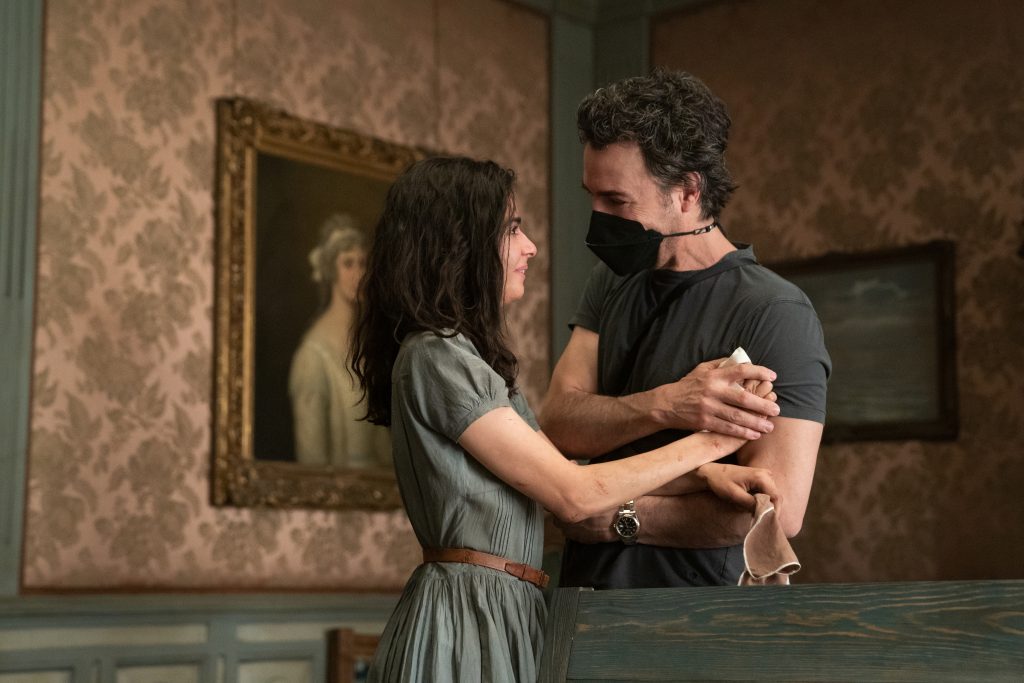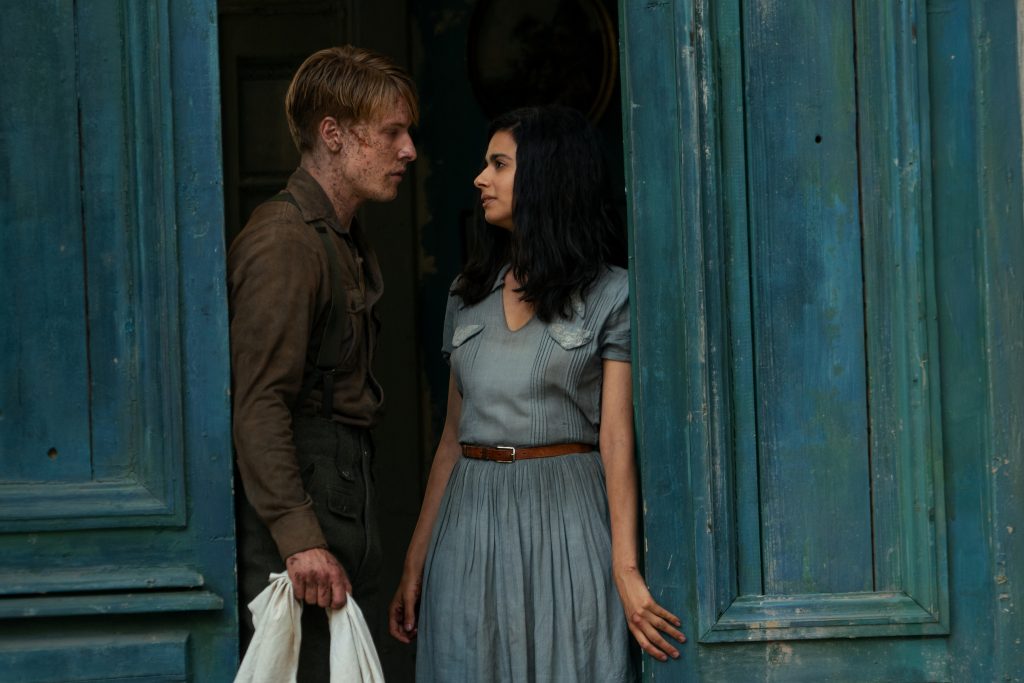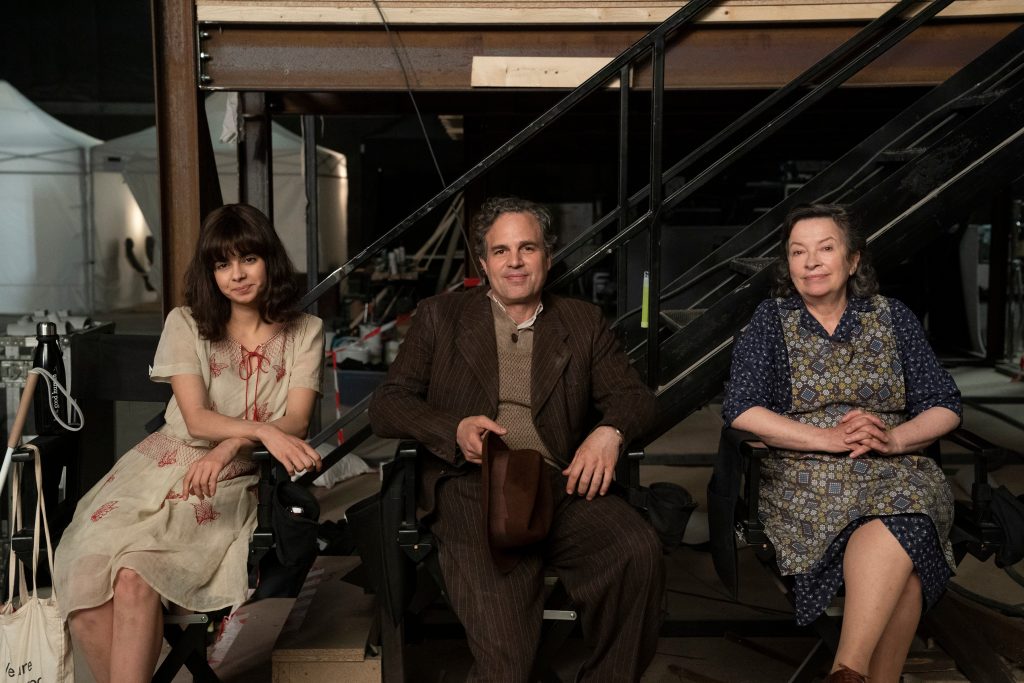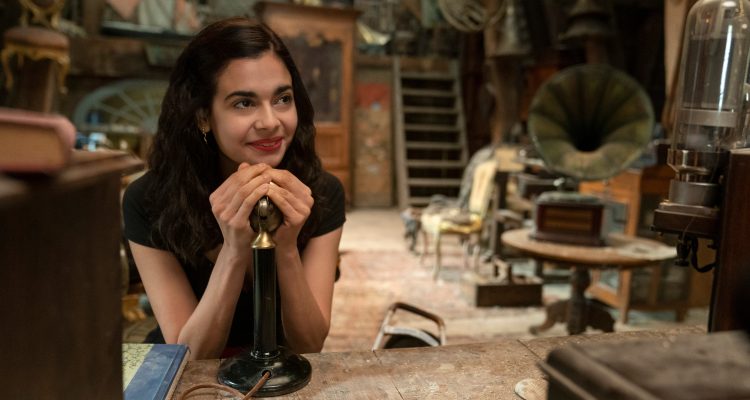When Aria Mia Loberti auditioned for the lead role on Netflix’s adaptation of Anthony Doerr’s Pulitzer prize-winning novel All the Light We Cannot See, she had never acted on camera, let alone performed opposite another actor. But that quickly changed after she was cast as a young, blind woman in Nazi-occupied France who broadcasts messages through her radio in the 4-episode series.
Loberti’s nuanced performance earned her an Indie Spirit Award nomination for Best Breakthrough Actress, with critics praising her quietly strong turn as Marie-Laure Blanc, the novel’s heroine. The Spiderwick Chronicle’s actor entered an open casting call to secure the role and beat out thousands of applicants in the adaptation helmed by Free Guy director Shawn Levy.
The series, which also stars Mark Ruffalo, Hugh Laurie, and Lars Eidinger, follows Marie-Laure, who is being relentlessly pursued by a brutal Gestapo office (Eidinger) as she transmits radio broadcasts as part of the resistance. Her story intertwines with Werner (Louis Hofman), a brilliant teenager enlisted by Hitler’s regime but who shares a secret connection with Marie-Laure in the final days of World War II.
Loberti, who is an academic and has low vision due to a genetic condition, is captivating in the role, brilliantly harnessing Marie-Laure’s strength in the most harrowing moments. The role required Loberti to perform stunt work and she credits Shawn Levy with ensuring that she felt safe on set and, as a newcomer, was exposed to all sides of production before filming her scenes.
“ [Shawn] let me go and shadow all of the department heads, so I knew what everyone was doing,” explains Loberti. “I’m really grateful that he designed it that way because it helped me feel like I was more on top of things, and it felt like I was in a conservatory environment.”
Loberti spoke with Awards Focus about attending the Indie Spirit Awards and making eye contact with Anne Hathaway, how she pushed through a depressive period to self-tape for the role, why playing Marie-Laure helped her to guest star on Grey’s Anatomy, and how she benefited from years of being a ballerina when it came to stunt work.

Awards Focus: All The Light We Cannot See was released right after last year’s WGA and SAG-AFTRA strikes. What was it like promoting the show leading up to the release?
Aria Mia Loberti: It was interesting because I had done a lot of promotion before the strike. So, we had backlogged a lot of material, and it was preemptively wise and exciting to still have stuff out in the world, even though I wasn’t actively engaging with it at the time of release.
It was less trying than it could have been because we were thoughtful about how we were rolling this out. It was disappointing not to go to my premiere, but I’d rather have equal rights for workers than go to my own premiere and wear a pretty dress.
AF: What was the experience like for you being nominated for Best Breakthrough Performance at the Indie Spirit Awards this year and attending the ceremony?
Loberti: I grew up watching award shows but never really aspired to be an actor. This was my very first role, and I had never acted, taken an acting class, or done anything before this project. I was able to enjoy the experience instead of thinking of my younger self and all those questions that come along like, Did I make it? Did I do okay?
In many ways, not growing up in the industry allowed me to enjoy that experience more. It was such an honor to be in the room, and I was invited on stage to announce a category, which was amazing. I made like hard eye contact with Anne Hathaway and I was like, dead [laughs].
AF: As a fan of the novel, what stood out for you with how the series was adapted from the original novel?
Loberti: I was excited to read the scripts for a book I loved, so that was cool. That was one of the most exciting parts of the process. I was fortunate to have the scripts immediately after I was cast.
As a reader, as someone who likes books and will pick up a 600-page book with no issue, I realize that many people don’t want to do that. That’s not something they want to spend their free time doing, or it’s hard or restrictive. I was just happy to see a script that took the heart of the book, the characters, and their souls and put them in a format that anybody could connect with. Even if they would never pick up this big historical doorstopper, they will turn on a TV show for four hours on Netflix and keep watching each episode and have access to this beautiful, magical message.

AF: As someone who wasn’t actively pursuing acting as a career, what motivated you to audition for the role of Marie?
Loberti: My love for the book got me over the edge to send in the tape. However, the reality of my sending the tape was mostly that it was a time when I was really depressed, and I was having a really bad week, and someone sent the self-tape notice to me even though they knew I didn’t act. They knew I didn’t do anything like this. At first, I said no, thank you, that’s really sweet, but it’s going to go to someone who has at least taken an acting class before. The thought of being involved just enamored me, and even though I said no, I kept thinking about it, but more in the context of I can’t wait to see who they do cast if they are going to do this cattle call.
It felt like a Harry Potter casting search, and I grew up seeing those all over the internet. For about 48 hours, I was just enamored with the concept of sending in this tape, knowing that it didn’t have to mean anything. I had this weird combination of being really depressed and also really grateful that I’d gotten to the point where I had academically. I was fine with making an idiot out of myself and then going to audition for an improv troupe. I’m not sure I would have taken that jump to audition if it wasn’t a book my mom and I loved.
By the time I was talking to Shawn [Levy], I was like, this is so cool. I felt better. I feel like my mental health was remedying itself because, for the first time in years, I had something that wasn’t work. The audition process was just like these beautiful hour-long moments that I would look forward to every day over this three-week period.
AF: For your first acting role, how did you develop a relationship with the camera and the large amount of crew members for the scale of the production?
Loberti: We had around three to 400 people on set. It was really big. Little did I know that it was 400 people watching me cry every day. Shawn was very good about making sure that I was prepared and what they did to the schedule was amazing, which by itself speaks to the scope. They put all of Lewis’s [Hofman] scenes first, and I flew out and watched Shawn film Lewis’s scenes for three weeks. I saw what everyone on the crew was doing, and Shawn would teach me everything.
He showed me how he made a shotlist and then he’d bring me over to the camera and he’d teach me about what lens they used and how they would frame something and what the different types of frames are called and how you would play to each frame and different scenes and your movement. He taught me all these things and then let me go and shadow all of the department heads so I knew what everyone was doing. So when they were coming up to me and tugging on my belt or building something in the back, I didn’t have to worry about like, wait, what’s that noise?
I’m really grateful that he designed it that way. It helped me feel like I was more on top of things because it felt like I was in a conservatory environment. The production also put me with an acting coach, who I still use now, Bob Krakauer. He was extraordinary, and he really took to heart that I came from an academic background. Sometimes, I’d want to go through a scene with him, and he’d say that it would ruin the magic. You have to feel it in your soul. If I critique you, tell you certain things, or give you certain pieces, it will take away your naturalness. That’s why you’re here. It was really scary for me to learn.

AF: It sounds like a beautifully supportive environment. You also recently appeared as a guest star on Grey’s Anatomy. Did you find a difference in production environments between a show in its first season and one in its twentieth, like Grey’s?
Loberti: What was helpful to me was that after All The Light wrapped, I went on to my second audition ever for a show called The Spiderwick Chronicles. I was grateful that I was able to have that experience before I did something like Grey’s because I understood the idea of filming a fourth episode in a season to the rest of the story. By the time I got to Grey’s, I had experiences that helped me understand what being part of a fixture was like. When the day players would come on set of All the Light, I felt like they looked to the tone of the set and the environment that we built, and I felt responsible for that because I was there all the time. I wanted to make it feel comfortable for everyone.
When I got to Grey’s, what was really beautiful was that they had been there for 20 years. They have this thing down to the science of making sure that when the nervous guest star comes in, they feel loved, seen, and comfortable. I aspire to be like those women. They were just extraordinary.
AF: Can you talk about the stunt work in episode one of All the Light and what it was like working with Lars Eidinger in those scenes that required you to be underwater?
Loberti: Everything you see on screen in the show was me. We didn’t double anything, and the stunt team taught me how the scene and movements would work.
The underwater scenes are probably some of the most dangerous scenes that I’d do because you don’t have control over the water tank and the water level. You also don’t have a certain level of control over the water itself. It has a mind of its own as much as you can control it. So those scenes were filmed in daylight in a tent to make it look like night, and it was a built set. It was a whole week on the set, and I was freezing because you could see all the neoprene through my dress, so I had to axe the neoprene.
I’ve been a ballerina for 13 years, and having that heightened sense of body awareness, control, and flexibility reassured the team, too. I think it made it a much safer experience.
Lars was so wonderful because he’s a dad and about a foot and a half taller than me. He was crying throughout because he felt like a horrible human, even though I know it’s fake. He’s an extraordinary person, and he’s really technical, and that was something that I needed to ground me.
On the first day of us doing the dunking scene, I didn’t know how to stop my tears. It was easier for me just to cry all day. He gave me a lot of advice, such as how you can build up and then soften back down so you can enjoy your lunch instead of sobbing. I love him to death and think he’s so masterful and kind, and I hope people who watch the show know that, too.


